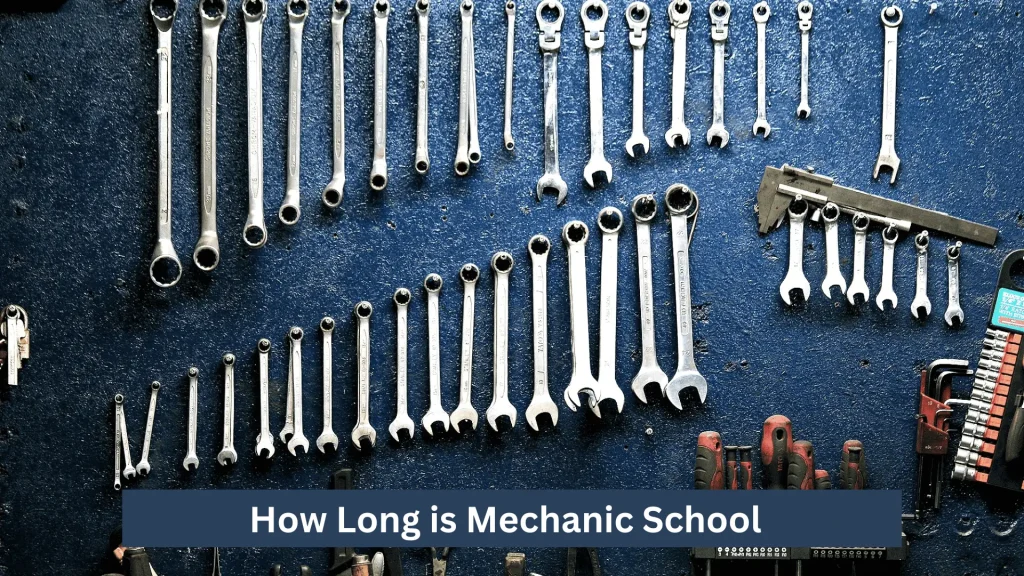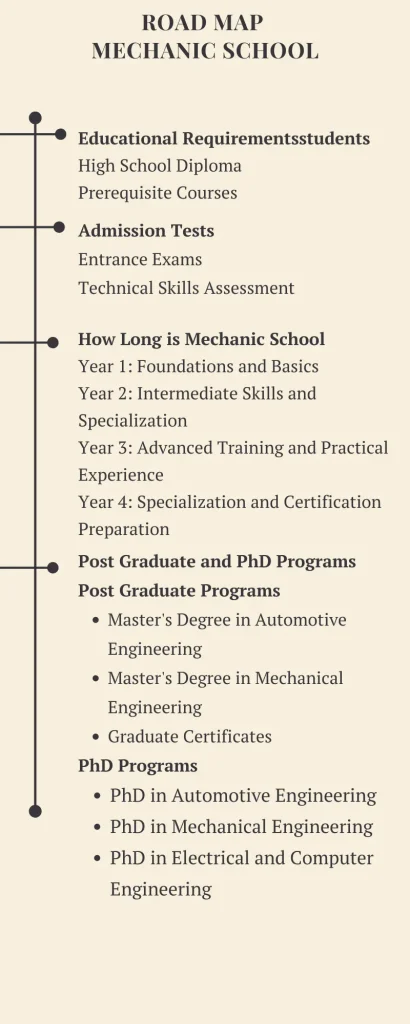How Long is Mechanic School
How Long is Mechanic School? Mechanic school typically lasts between 6 months to 2 years, depending on the program and specialization. Certificate programs are shorter, while associate degrees take longer. Understanding how long is mechanic school helps prospective students plan their education and career paths effectively, ensuring they choose the right program duration.
What is Mechanic School
Mechanic school is an educational institution or program that trains students in the skills needed to repair and maintain vehicles. These programs cover a wide range of topics, including engine repair, electrical systems, diagnostics, and preventive maintenance. Students learn both theoretical knowledge and hands-on skills to prepare for careers as professional mechanics.

Mechanic schools often offer various certifications and degrees, such as diplomas, certificates, and associate degrees. The curriculum is designed to provide comprehensive training, ensuring graduates are well-equipped to handle the demands of the automotive industry. These schools also help students prepare for industry certification exams, enhancing their employability and career prospects.
How Long is Mechanic School
Year 1: Foundations and Basics
Introduction to Automotive Technology: Students learn the basics of automotive systems, tools, and safety procedures.
Engine Repair and Maintenance: Focus on understanding engine components, diagnostics, and repair techniques.
Basic Electrical Systems: Introduction to automotive electrical systems, including wiring, circuits, and battery testing.
General Education Courses: Courses such as mathematics, communication, and computer skills to provide a well-rounded education.
Year 2: Intermediate Skills and Specialization
Advanced Engine Performance: In-depth study of engine performance, fuel systems, and emission controls.
Transmission and Drivetrain: Understanding of manual and automatic transmissions, as well as drivetrain systems.
Advanced Electrical and Electronic Systems: Detailed study of automotive electronics, including sensors, actuators, and advanced diagnostics.
Suspension and Steering Systems: Learning about suspension components, alignment, and steering mechanisms.
Year 3: Advanced Training and Practical Experience
Heating and Air Conditioning: Training on HVAC systems in vehicles, including repair and maintenance.
Brakes and Safety Systems: Detailed understanding of brake systems, ABS, and other vehicle safety features.
Internship or Cooperative Education: Practical experience through internships or co-op programs with local automotive shops or dealerships.
General Education Courses: Additional general education courses to fulfill degree requirements.
Year 4: Specialization and Certification Preparation
Specialty Courses: Opportunities to specialize in areas such as diesel technology, hybrid and electric vehicles, or performance tuning.
Capstone Project: A comprehensive project that integrates the knowledge and skills acquired throughout the program.
Certification Preparation: Focused preparation for industry certification exams such as ASE (Automotive Service Excellence) certifications.
Career Readiness: Courses on resume writing, job search strategies, and interview skills to prepare for entering the workforce.

How to Enter Mechanic School
Educational Requirements for Mechanic School
High School Diploma or Equivalent: Most mechanic schools require applicants to have a high school diploma or GED.
Basic Math and Science Skills: Courses in mathematics, physics, and chemistry are beneficial.
Computer Literacy: Basic computer skills are often necessary, as modern vehicles rely heavily on electronic systems.
Entry Tests for Mechanic School
Entrance Exams: Some schools may require an entrance exam to assess basic skills in math and reading comprehension.
Technical Skills Assessment: A few programs might have a technical skills assessment to evaluate the applicant’s mechanical aptitude.
Interview: An interview may be conducted to understand the applicant’s interest and suitability for the program.
Application Process for Mechanic School
Research and Selection: Research various mechanic schools and select the one that best fits your career goals.
Application Form: Complete the school’s application form, either online or in person.
Transcripts: Submit high school transcripts or GED scores.
Letters of Recommendation: Some schools might ask for letters of recommendation from teachers or employers.
Personal Statement: Write a personal statement explaining your interest in becoming a mechanic and your career aspirations.
Application Fee: Pay any required application fee, which can vary by institution.
Financial Aid for Mechanic School
Federal Financial Aid: Apply for federal financial aid through the Free Application for Federal Student Aid (FAFSA).
Scholarships: Look for scholarships specifically for automotive technology students, which can be offered by schools, private organizations, or industry groups.
Grants: Apply for grants such as the Federal Pell Grant or state-specific grants that do not need to be repaid.
Loans: Consider federal student loans, which often have lower interest rates and more favorable repayment terms than private loans.
Work-Study Programs: Some schools offer work-study programs that allow students to work part-time while attending school to help cover tuition and other expenses.
Veterans Benefits: If applicable, explore benefits available through the GI Bill or other veterans’ educational assistance programs.
Post Graduate Programs for Mechanic School
Post Graduate Programs
Master’s Degree in Automotive Engineering
Duration: 1-2 years
Focus Areas: Advanced vehicle design, automotive electronics, powertrain engineering, and sustainable mobility.
Coursework: Vehicle dynamics, advanced materials, CAD/CAM, alternative fuels, and hybrid technologies.
Research Opportunities: In-depth research projects, often in collaboration with automotive companies.
Master’s Degree in Mechanical Engineering
Duration: 1-2 years
Focus Areas: Broad engineering principles with a specialization in automotive systems.
Coursework: Advanced thermodynamics, fluid mechanics, materials science, and robotics.
Capstone Project: Practical projects or theses related to automotive technologies and innovations.
Graduate Certificates
Duration: 6 months to 1 year
Specializations: Automotive technology, hybrid and electric vehicles, automotive management, and diagnostics.
Coursework: Focused on specific areas of automotive technology to enhance specialized skills.
PhD Programs Related to Mechanic School
PhD in Automotive Engineering
Duration: 3-5 years
Research Focus: Original research in vehicle design, safety systems, automotive electronics, powertrains, and sustainable technologies.
Dissertation: In-depth research leading to a dissertation that contributes new knowledge to the field of automotive engineering.
Coursework: Advanced studies in vehicle dynamics, control systems, computational modeling, and simulation.
PhD in Mechanical Engineering
Duration: 3-5 years
Research Focus: Broad mechanical engineering topics with potential specialization in automotive engineering.
Dissertation: Original research contributing to fields such as fluid dynamics, material science, robotics, or thermal systems.
Coursework: Advanced mechanical engineering principles, with opportunities to focus on automotive-related research.
PhD in Electrical and Computer Engineering
Duration: 3-5 years
Research Focus: Automotive electronics, autonomous vehicle technologies, and advanced diagnostic systems.
Dissertation: Research in areas such as vehicle communication systems, sensor technologies, and control systems.
Coursework: Advanced electronics, control theory, signal processing, and machine learning.
Top 10 Mechanic Schools

1.Universal Technical Institute (UTI)
Location: Multiple campuses across the United States
Programs: Automotive, diesel, collision repair, motorcycle, and marine mechanics
Special Features: Manufacturer-specific advanced training (MSAT) programs with partners like Ford, BMW, and Mercedes-Benz
2.Lincoln Tech
Location: Multiple campuses across the United States
Programs: Automotive technology, diesel technology, collision repair, and welding
Special Features: Hands-on training, partnerships with leading automotive companies, and comprehensive career services
3.Wyotech
Location: Laramie, Wyoming
Programs: Automotive technology, diesel technology, collision/refinishing technology, and specialty programs like high-performance powertrains
Special Features: Intensive hands-on training with a focus on performance and diagnostics
4.NASCAR Technical Institute (NTI)
Location: Mooresville, North Carolina
Programs: Automotive technology, NASCAR-specific training, and Ford FACT
Special Features: Unique partnership with NASCAR for specialized training in motorsports technology
5.Pennsylvania College of Technology
Location: Williamsport, Pennsylvania
Programs: Automotive technology, automotive management, collision repair, and restoration
Special Features: State-of-the-art facilities, industry partnerships, and a strong emphasis on hands-on learning
6.Ferris State University
Location: Big Rapids, Michigan
Programs: Automotive engineering technology, heavy equipment technology, and automotive management
Special Features: Bachelor’s and associate degrees, industry internships, and modern laboratories
7.Ohio Technical College
Location: Cleveland, Ohio
Programs: Automotive technology, diesel equipment, collision repair, and high-performance and racing technology
Special Features: Advanced training programs, hands-on learning, and partnerships with leading automotive brands
8.Central Piedmont Community College
Location: Charlotte, North Carolina
Programs: Automotive systems technology, heavy equipment and transport technology, and alternative fuel vehicle technology
Special Features: Affordable tuition, comprehensive training programs, and strong local industry connections
9.Portland Community College
Location: Portland, Oregon
Programs: Automotive service technology, diesel service technology, and collision repair technology
Special Features: Emphasis on sustainability and green technologies, modern facilities, and extensive hands-on training
10.University of Northwestern Ohio (UNOH)
Location: Lima, Ohio
Programs: Automotive technology, diesel technology, high-performance motorsports, and alternative fuels
Special Features: Year-round scheduling, flexible programs, and extensive hands-on experience with advanced equipment
Factors Affecting the Length of Mechanic School
Type of Program
Certificate Programs: Typically last between 6 months to 1 year and focus on fundamental skills and knowledge.
Diploma Programs: Usually take about 1 year to complete and offer a more in-depth understanding than certificate programs.
Associate Degrees: Generally require 2 years of study and include both technical training and general education courses.
Specialization
General Automotive Mechanic: Programs for general automotive mechanics are often shorter.
Advanced Specializations: Specializations such as diesel technology, hybrid and electric vehicles, or high-performance engines may require additional coursework and time.
Mode of Study
Full-Time Programs: Full-time students can complete their training more quickly, typically within the standard duration of the program.
Part-Time Programs: Part-time students may take longer to complete their training due to reduced course loads.
Curriculum Requirements
Core Curriculum: Basic programs covering essential automotive systems can be shorter.
Comprehensive Curriculum: Programs that include a wider range of topics such as advanced diagnostics, electronics, and specialized systems may take longer.
Final Verdict
The length of mechanic school varies based on program type, specialization, mode of study, and other factors. Understanding these variables helps prospective students make informed decisions about their education and career paths in the automotive industry.
FAQs
1.How long does it typically take to complete a mechanic program?
Mechanic programs range from 6 months to 2 years, depending on the type of certification or degree pursued.
2.What are the prerequisites for enrolling in a mechanic school?
Most schools require a high school diploma or GED, basic math and science skills, and computer literacy.
3.Are there financial aid options available for mechanic school students?
Yes, students can apply for federal financial aid, scholarships, grants, loans, work-study programs, and veterans benefits.
4.Can I specialize in a specific area of automotive mechanics?
Yes, many programs offer specializations in areas such as diesel technology, hybrid and electric vehicles, or high-performance engines.
5.Is hands-on training a part of mechanic school programs?
Yes, most programs include extensive hands-on training, internships, or cooperative education components to provide practical experience.
